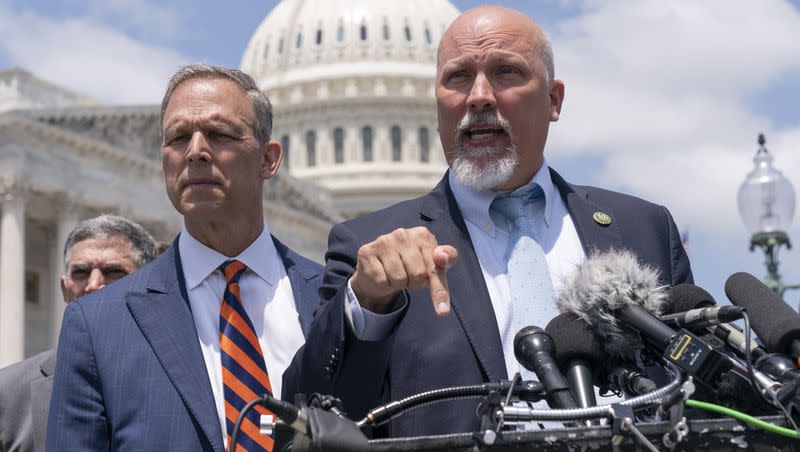How Republicans are responding to the debt ceiling bill

- Oops!Something went wrong.Please try again later.
- Oops!Something went wrong.Please try again later.
- Oops!Something went wrong.Please try again later.
- Oops!Something went wrong.Please try again later.
- Oops!Something went wrong.Please try again later.
House Speaker Kevin McCarthy said he reached a deal with President Joe Biden to raise the debt ceiling and most of his conference is on board. Not every Republican is ready to vote yes or support the deal, though.
The bill has the backing of Republicans including Sen. Mitt Romney of Utah, Rep. Dusty Johnson of South Dakota and Rep. Elise Stefanik of New York, the No. 3 House Republican. Romney called the bill a “good-faith bipartisan compromise” and Johnson said he was sure it would pass, but to not expect unanimous support.
“I’ve talked to dozens of members, and listen, not every single member is on board,” Johnson told NBC News Monday. “But when was the last time that every single member of Congress agreed on anything?”
Members of the House Freedom Caucus, a conservative group, are among the most vocal opponents of the deal.
“What I see here in this deal is absolutely one of the biggest abominations since I’ve been in Washington, D.C.,” Rep. Andy Biggs, R-Ariz., a caucus member, said Tuesday at a press conference. “I’m going to vote no, I urge my colleagues to vote no.”
Rep. Chip Roy, R-Texas, another caucus member, said the deal was at best, a “spending freeze for a couple years, that’s it, that’s about what you get,” while Rep. Ralph Norman, R-S.C., said Republicans should risk default, something former President Donald Trump has called for.
“Let’s call their bluff on it, the best deal is no deal,” Norman said during the press conference. “Once you dissect the bill, this bill is un-American, it defies conservatism.”
There is some opposition to the bill outside the House Freedom Caucus as well, including Rep. Nancy Mace, R-S.C., who criticized it for not setting a debt limit dollar amount but instead suspending it until Jan. 2, 2025.
“Sixty-three percent of Americans want Congress to cut spending as part of a debt ceiling deal. This bill doesn’t do that. Unacceptable,” Mace tweeted, referencing an AP-NORC poll released earlier this month. “Washington is, was and always will be lousy at responsibly spending your tax dollars. That won’t change unless we demand change.”
Related
Florida Gov. Ron DeSantis, who announced his presidential campaign last week, indicated he’s opposed to the bill.
“Prior to this deal ... our country was careening towards bankruptcy and after this deal our country will still be careening towards bankruptcy,” DeSantis told “Fox & Friends.”
Former Arkansas Gov. Asa Hutchinson, another Republican presidential candidate, said he backs the deal. Hutchinson praised McCarthy because of the bill’s work requirements and for doing “an excellent job shepherding this for the Republican majority in Congress” in an interview with MSNBC.
Entrepreneur and presidential candidate Vivek Ramaswamy said he wouldn’t vote for the bill if he was in the House because it was “too incremental.”
“We still have a spending crisis in this country,” he told “Fox Business.” “The point of these negotiations should be to actually address the fiscal crisis, not to window dress around it.”

